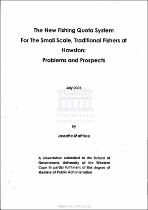| dc.description.abstract | Hawston, a small fishing town situated in Greater Hermanus is famous for its lucrative abalone resource. Since the drastic reduction of the abalone quota, which was implemented from 1994-2001, black commercial abalone divers have been on the receiving end of the new fishing legislation. The decimation of abalone by illegal harvesters, and the annual allocation of one and a half ton of abalone to all black
commercial divers at present, are serious factors that influence the future of the commercial abalone divers and their counterparts. An abalone quota plays a pivotal role regarding the existence of various groups of people namely the Southern boat assistants, Overberg commercial abalone divers, Hawston fishing community etc. This study attempts to examine the effects of the drastic reduction of the abalone quota on the commercial divers (from 22-ton to one and a half ton), the boat assistants and the Hawston fishing community. The mentioned groups are also engaged in harvesting their allocated crayfish quotas, the research project mainly focuses on the effect of the new quota system on the allocation of abalone and crayfish quotas in Hawston. In essence, this research project seeks to examine the validity or invalidity of the White Paper regarding policies of the new Living Resources Act on commercial abalone divers, the boat assistants and the Hawston fishing community. The researcher has noted the various shortcomings in the White Paper on Marine Resources and the associated indiscrepancies being practiced by the Department of Environmental Affairs. In the study, a qualitative method is used to assess the impact of the implementation of new fishing quotas on various social groups in Hawston (existing and new groups). This was done by means of in-depth interviews. Some of the policy makers at the Department of Environmental Affairs were also interviewed. An evaluation of data gathered through the use of interviews and review of primary and secondary literature, revealed that equitable fishing quota allocation systems are not addressing the needs of the small-scale fishers in Hawston. By means of reports, it was concluded that various factors are infringing on the rights of those excluded from receiving allocation systems and also has the effect of fuelling uncertainty for the future of commercial abalone divers and small scale fishers in Hawston. The primary objective of this study is to investigate if the White Paper Policy on Marine Resources is benefiting the disadvantaged small-scale fishers in Hawston. Most important for the commercial abalone diver in Hawston, is the effect of the decimation of abalone and how legislation in the new quota system will influence their lives. | en_US |

